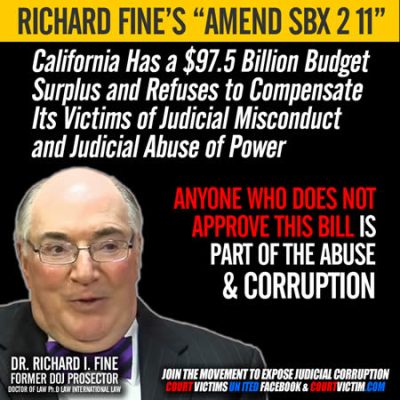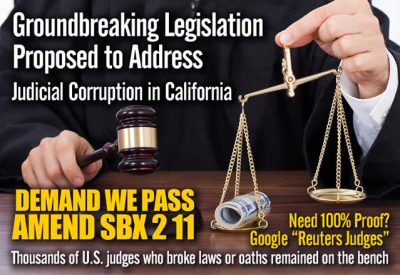California Has a $97.5 Billion Budget Surplus and Refuses to Compensate Its Victims of Judicial Misconduct and Judicial Abuse of Power

I. Introduction. California is in a Judicial Corruption Crisis, and has been, since the mid to late 1980s when Los Angeles County began paying “supplemental or local judicial benefits” to California State Superior judges sitting on the California State Superior Court for the County of Los Angeles. This crisis has been exasperated by the California Legislature’s failure to resolve the crisis despite the Court’s ruling it was the Legislature’s constitutional responsibility on two occasions in 2011 and 2015. This 2022 California legislative session, the California Legislature was presented with: (1) a draft Bill Amending SBX 2 11 and related Government Code Sections; Establishing State of California Commission on Judicial Oversight and Victims Compensation for Judicial Misconduct and Judicial Abuse of Power; and (2) an immediate method to enact the Legislation by “Floor Amendment”. The Legislature refused to act prior to the 2022 session ending on August 31, 2022. This article will discuss: (1) The Historic Judicial Corruption Problem created by County and Court Payments to California State Superior Court Judges; (2) The Present State of California’s Judicial Corruption; (3) The Failure of the California Legislature to Resolve the Judicial Corruption Problem despite the Court’s Ruling on two Occasions in 2011 and 2015; (4) The Immediate Proposed Legislative Solution to the Judicial Corruption Problem; (5) An Immediate Method to Enact the Legislation by “Floor Amendment”; and (6) The Voters’ Solution if the Present Legislature Continues to Refuse to Enact the Immediate Solution in the Extended Legislative Session. II. The Historic Corruption Problem created by County and Court Payments to California State Superior Court Judges. Article VI, Section 19 of the California Constitution states in relevant part: “The Legislature shall prescribe compensation for judges of courts of record.” Commencing in the mid… Read More




